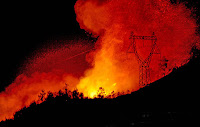 |
| Deforestation in Bangladesh |
Tropical forests of the world are degrading at an alarming rate because of population growth and human poverty, acute shortage of fuelwood, fodder and timber and a continuous decline in the amount of per capita cultivable land.
Bangladesh, a South Asian least developed country, has been experiencing severe deforestation over the last 3 to 4 decades. During the period 2000-2005, deforestation rate in Bangladesh has been estimated at 3.3% per year. In Bangladesh, deforestation results mainly clearing agriculture land, principally shifting or jhum cultivation. About 85,000 hectares of the hill forests reserves under the practice of shifting cultivation and about 60,000 families engaged there. Of the three major forest categories (hill, inland Shorea robusta, Gaerten. f., and mangrove forests), the hill forests (48%) are the most important watershed areas of the country and are composed of tropical evergreen and semi-evergreen tree species.
A rapid deforestation not only diminishes vegetative cover and species diversity; it may accelerate surface runoff, increase soil compaction and deteriorate soil biochemical properties, and often affects climate by releasing stored soil carbon as CO2 into the troposphere.
The natures in which the tropical hill forest ecosystems are being deforested and degraded are becoming an ecological concern. Under regular protection, allow for natural regeneration and improvement of soil quality in the degraded forest ecosystems can be achieved over time.
Bangladesh, a South Asian least developed country, has been experiencing severe deforestation over the last 3 to 4 decades. During the period 2000-2005, deforestation rate in Bangladesh has been estimated at 3.3% per year. In Bangladesh, deforestation results mainly clearing agriculture land, principally shifting or jhum cultivation. About 85,000 hectares of the hill forests reserves under the practice of shifting cultivation and about 60,000 families engaged there. Of the three major forest categories (hill, inland Shorea robusta, Gaerten. f., and mangrove forests), the hill forests (48%) are the most important watershed areas of the country and are composed of tropical evergreen and semi-evergreen tree species.
A rapid deforestation not only diminishes vegetative cover and species diversity; it may accelerate surface runoff, increase soil compaction and deteriorate soil biochemical properties, and often affects climate by releasing stored soil carbon as CO2 into the troposphere.
The natures in which the tropical hill forest ecosystems are being deforested and degraded are becoming an ecological concern. Under regular protection, allow for natural regeneration and improvement of soil quality in the degraded forest ecosystems can be achieved over time.

